‘Call their bluff or not?’ How Jackson County voters are approaching stadiums tax election
- Oops!Something went wrong.Please try again later.
Phil Andreas grew up enjoying downtown baseball in St. Louis. He attends a handful of Royals games every year. Framed jerseys of Chiefs greats Christian Okoye and Tyreek Hill hang in the offices of his digital marketing firm.
He is not sold on the stadiums sales tax.
Jackson County voters will decide on Tuesday whether to authorize a 3/8th-cent sales tax that would last 40 years to help fund a new Royals stadium in Kansas City’s Crossroads and renovations of Arrowhead Stadium for the Chiefs. If the tax passes, the teams have committed to staying in Jackson County, their home since the 1960s.
Andreas serves as the mayor of Lone Jack, a city of roughly 1,500 people in southeast Jackson County. In his corner of the county, he hasn’t heard a single person “who doesn’t think moving the stadium downtown is not a dumbass idea.”
The Truman Sports Complex — the sprawling sea of concrete and asphalt along Interstate 70 that houses both teams — is convenient, he said. He’d rather see a new Royals stadium built partially on the footprint of the old one, like Busch Stadium in St. Louis. And he and other area residents don’t trust the county government after the “mess” made of the pandemic and the recent property tax assessment debacle.
But he doesn’t know how he’s going to vote.
“Do you want to call their bluff or not?” Andreas said. “Because it’s very hard to move a major franchise out of market, but it would not be hard for the Royals to go to North Kansas City, the Chiefs to go over by the Speedway (in Wyandotte County) or something like that — where they’re still the Kansas City Royals, Kansas City Chiefs, but Jackson County takes a huge hit.”
The Star spoke with numerous Jackson County voters this week ahead of Tuesday’s momentous vote. What emerges is a portrait of a county divided — between yes and no, between support and opposition for Crossroads baseball. But it’s also a county on edge, with voters nursing an uneasy sense that this vote marks a turning point bearing permanent consequences. There’s a real fear of making the wrong choice.
The fear of loss, of losing not just the Royals but also the dynasty-in-rising Chiefs, lurks in the minds of many voters. The teams are the county’s crown jewels, every year drawing in thousands upon thousands of fans who spend money, and focusing a global spotlight (with some recent help from Taylor Swift) on Jackson County and Kansas City, Missouri.
The Chiefs and Royals have maintained a kind of strategic ambiguity on whether they really would leave Jackson County if the sales tax fails. Is this the only shot? Would there be another chance to negotiate? The teams aren’t saying, allowing voters with reservations to sit with that fear.
“What’s the worst thing that can happen? We have two empty stadiums out here with no teams to fill them. So I can’t tell you I’m all ready to vote no on it, but I think it’s been handled poorly,” said Paul McGraw, a dentist who lives in Lee’s Summit.
McGraw’s family has held Chiefs season tickets for half a century. His grandfather, G. Leslie DeLapp, sat on the Jackson County Sports Complex Authority in the lead up to the construction of Royals Stadium in 1973. McGraw wishes aid for the Chiefs and Royals would be weighed separately, given the Royals’ middling on-field performance.
“We’re kind of getting caught in the middle and kind of being blackmailed to move this Royals stadium downtown to support the Chiefs and keep them in town,” McGraw said.
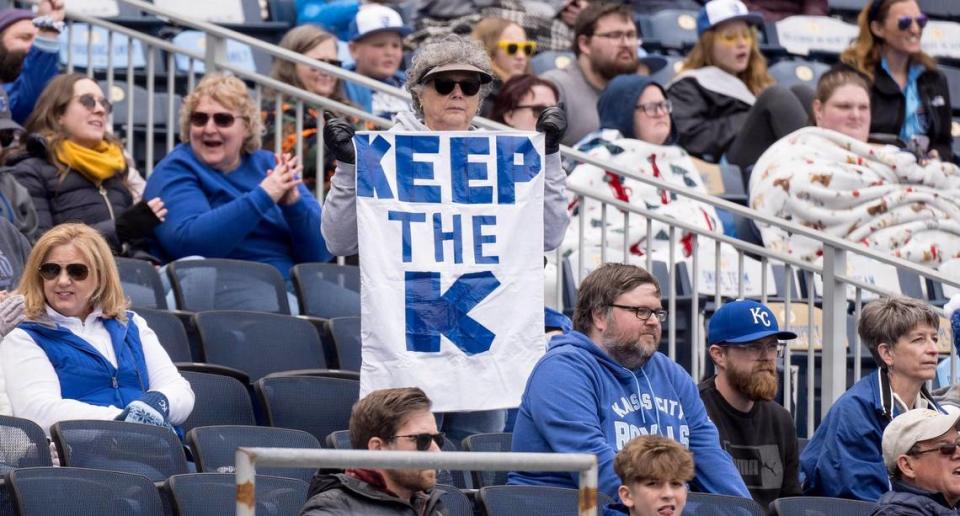
‘I’m really struggling’
The outcome of the vote remains uncertain. A poll conducted mid-March by Remington Research Group, a polling outfit linked to the political consulting firm running the Vote Yes campaign, found yes and no effectively tied, several local TV stations reported last week. The Royals and Chiefs have pumped at least $3.2 million into the campaign – roughly 20 times more than opponents have spent.
The 3/8th-cent sales tax on the ballot is projected to generate roughly $2 billion over 40 years. The tax would replace the current 3/8-cent sales tax, set to expire in 2031, which funds the Truman Sports Complex.
The teams have shared renderings of their proposed projects and have pledged financial contributions: $1 billion from the Royals for the estimated $2 billion ballpark district in the Crossroads, and $300 million from the Chiefs for $800 million in renovations at its current Truman Sports Complex site. However, while the Chiefs’ contribution is cemented in lease documents, the Royals’ is not.
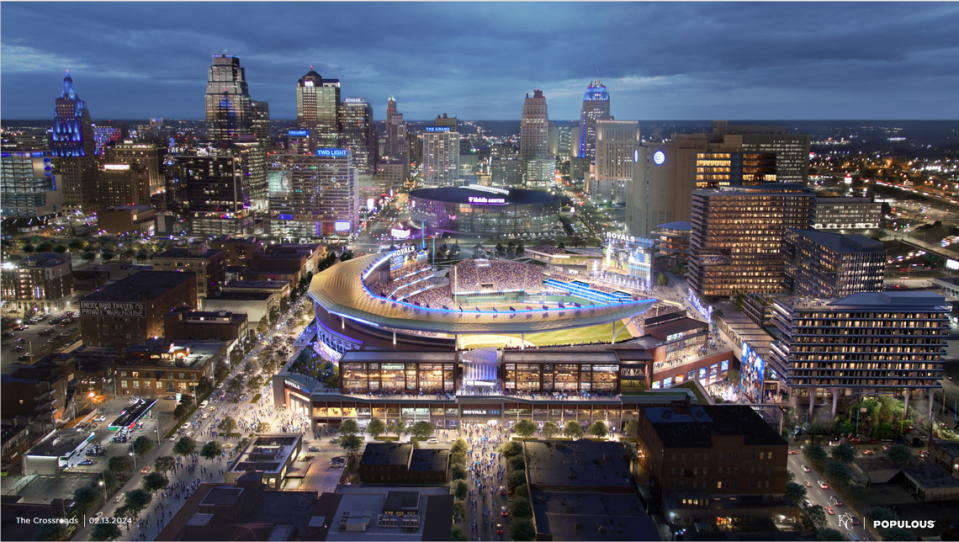
Key details — including what public benefits the teams say they will provide the community — have been in flux or have been announced only recently. The Crossroads site itself was only announced in mid-February.
“I’m really struggling,” said Oneta Templeton, a south Kansas City resident who was at Kauffman Stadium on Thursday for opening day. “I would hate to lose the Chiefs or Royals but I think we’re just hearing things just too much at the last minute.”
While some residents continue to contemplate their vote, others have arrived at a firm decision.
Armando Mesa, a 27-year-old resident of the northeast area of Kansas City, plans to vote yes, despite attending an event in opposition to the tax on Wednesday night. For Mesa, voting yes is the “best thing for me personally as a resident here.”
“I couldn’t imagine the city without the Chiefs and the Royals … and I think downtown baseball is really cool, a fun experience,” Mesa said.
Another northeast Kansas City resident, Kay Hopkins, took the opposite view — and is a hard no.
“In my opinion, there’s a complete lack of accountability, and the Royals have outright lied about the shape of the current stadium,” Hopkins said, a reference to disputed allegations that Kauffman Stadium suffers from bad concrete.
“I’d vote to expand the streetcar or to meet other real needs of the people in this city. But I’m about as opposed to this as you can be.”
Support and opposition to the tax have cut across typical partisan lines. Some liberal activists and libertarians opposed to the tax criticize what they view as corporate welfare and unsubstantiated claims about economic growth. On the other side, major business associations are supporting the tax alongside labor unions that stand to benefit from a major construction project.
On Tuesday evening, Royals owner John Sherman received a friendly reception at a question-and-answer session in the 18th and Vine Jazz District. The audience, which included several nearby business owners, appeared hopeful a Crossroads stadium could drive more traffic to the area, and urged Sherman to prioritize connecting the two districts along 18th Street.
“I’ve been telling everyone, get the yes out because unfortunately in the American context our areas tend to be just relevant because of their proximity to something that someone else likes, right?” Henry C. Service, an attorney whose law office is located at 18th and Vine, said at the event.
“I think even if it does some of this stuff that people are considering negative, we’ll at least get some development because people want to be close to the stadium.”
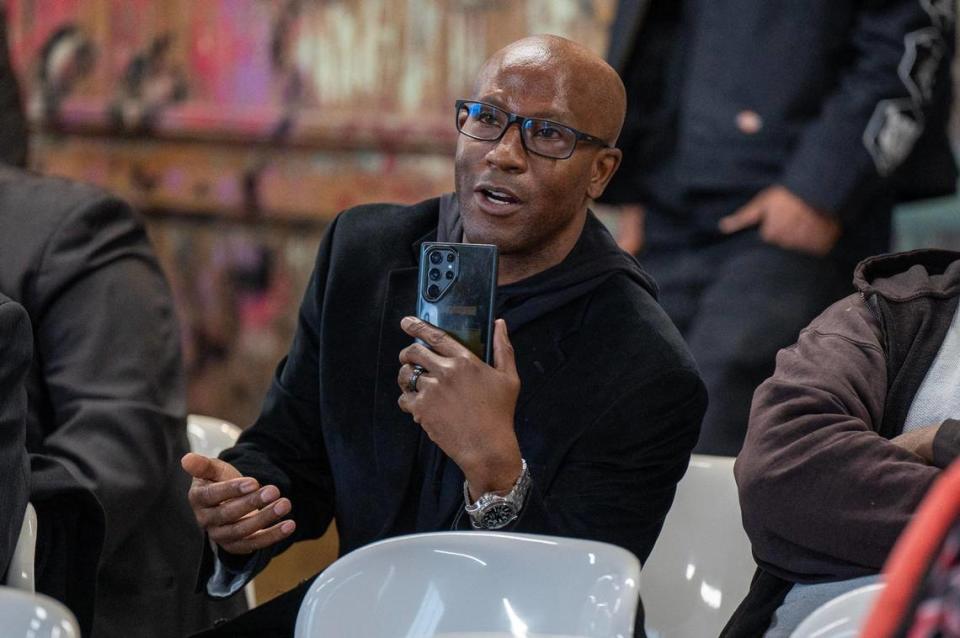
For some Crossroads businesses, that negative stuff includes the demolition of their buildings.
When the Royals outlined its proposed stadium, the footprint covered six city blocks, extending from Grand Boulevard to Locust Street, and 17th Street to Truman Road. The plan also included a ballpark district around the stadium with offices, retail and residential development.
“I think a lot of us were so filled with anger when we heard about this proposal,” said Kim Stanton, the director and organizer of Rural Grit, a folk collective that meets at The Brick, a bar just south of the proposed stadium site.
Bowing to pressure from Kansas City Mayor Quinton Lucas and others, Sherman on Wednesday promised to keep Oak Street open.
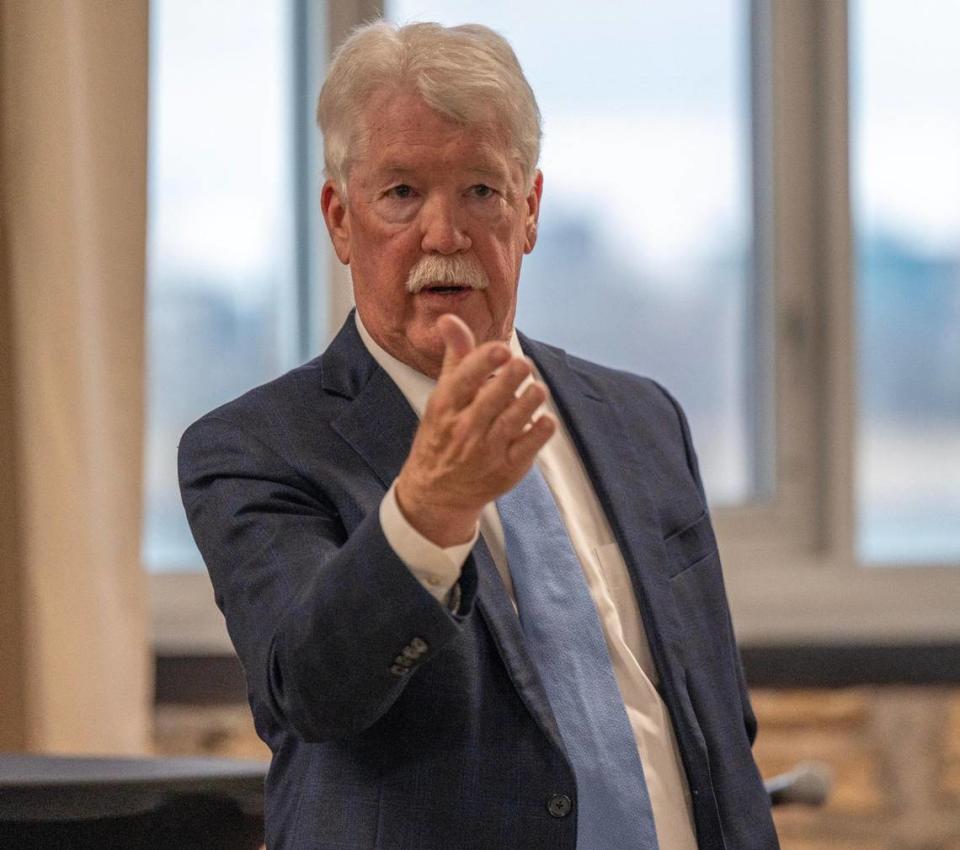
The displacement of businesses required under the Crossroads plan frustrates some voters, who wonder why the Royals didn’t choose another location. A site in the East Village had been under consideration, but the team rolled out the Crossroads proposal last month.
“I’m not against the Royals or even possibly paying the tax,” said Tim Tankard, a 68-year-old Brookside resident who said he attended the second-ever Royals game, at Municipal Stadium in 1969.
Tankard said he liked the East Village concept. “It’s blighted. It’s all empty warehouses and parking lots,” he said.
But “then they did this switcheroo to the Crossroads, and I feel it’s just so arrogant that they feel they can crush this neighborhood that all these people spent decades building up.”
Ryan Keeling, a 27-year-old who lives in Pendleton Heights, said one of their good friends lives in Star Lofts, located along 17th Street just south of the old Kansas City Star press plant — and bordering the proposed stadium site.
Hundreds of tenants live there, they said, with many of the units income-restricted.
“I don’t want to fund my friend’s displacement with my tax dollars,” Keeling said.
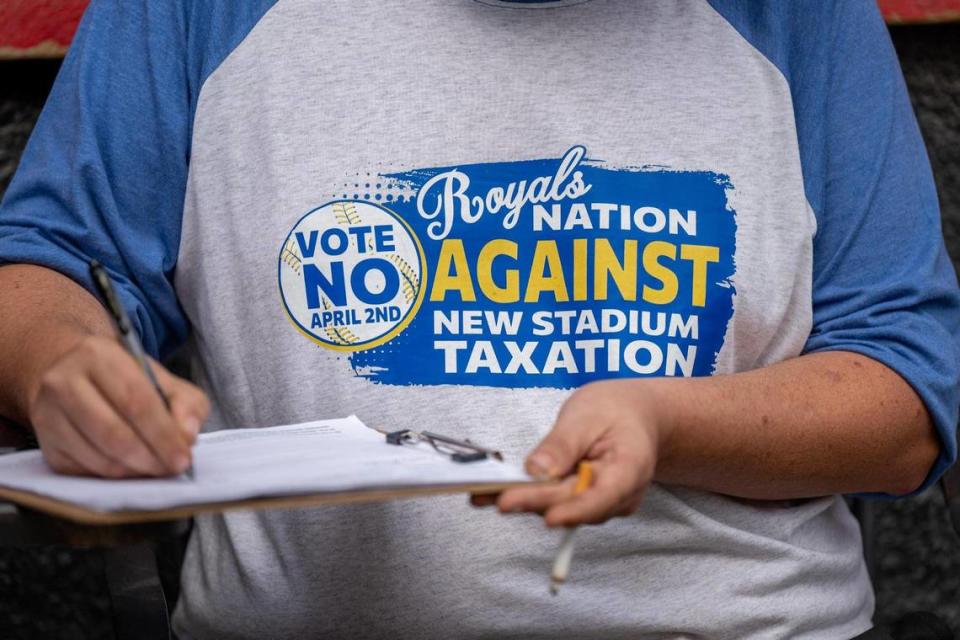
Voters already casting ballots
At the eastern edge of Jackson County, Oak Grove resident Keith Moyer said he’s leaning toward voting yes and has come around to the idea of a Crossroads stadium. While acknowledging that his current 20-minute drive to Kauffman Stadium is very convenient, he said the Crossroads site is probably the best location.
The East Village site looked “neat,” but Moyer, who is president of the local school board, wasn’t sure that location would have lent itself to hotels and entertainment to go around the stadium.
“I used to go First Fridays in the Crossroads, loved being down there for those kinds of things,” Moyer said. “To see that get shoved away, it’s concerning but there’s always a give and take with these things.”
Nearly 5,500 ballots had already been cast as of Wednesday, according to election officials. Election commissioners say the early voting turnout is better than in past municipal election years.
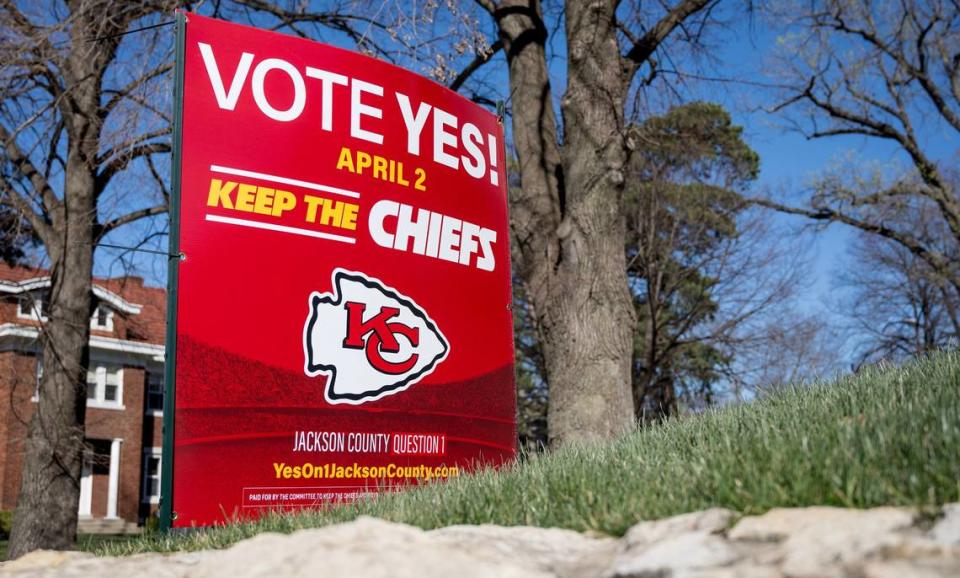
Andreas, the Lone Jack mayor, said he plans to post his thoughts about the stadiums tax vote on Facebook, but he’s not sure what he wants to say yet. Lone Jack has a road bond on the April 2 ballot and at open houses for the bond residents have asked him a lot of questions about the stadiums tax, he said.
“‘Do I want to line the pockets of billionaires with more money,’ or ‘they’ve got billions of dollars, let them pay for it themselves’ or ‘do I want the Royals downtown’ or ‘do I want to give the county any more of my money,’” Andreas said, recounting the questions and concerns he’s heard.
“They’re looking at one narrow aspect of it to make their decision when it’s just not that simple, unfortunately.”
The Star’s Nick Wagner, Eleanor Nash and Mike Hendricks contributed to this story


